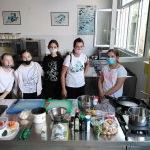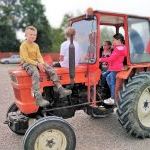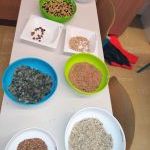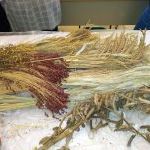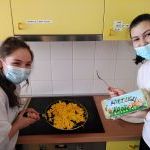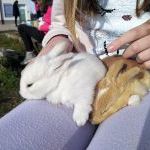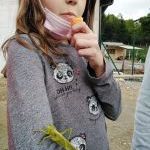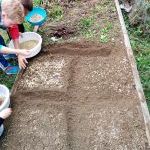Agriculture course with sensory food education
The agriculture course for primary and secondary schools is run by Tamara, a farmer who loves teaching children about what she does. Children are supported to take care of their own ecological garden, picking herbs in the surroundings and preparing their own food. Children learn about food and local dishes also on principles developed in project PESCA based on sensory education, where children learn through play. Children also work with wool and cut the grass. But the best part is having their very own animals in the schoolyard, including chicken and rabbits. When this is not possible, Tamara brings animals with her car to the school. Through this course, children also get to learn about their own local natural and cultural heritage. Due to project the awareness of the parents and the pupils has changed. Now they appreciate farming more, some even have gardens at home because their children wanted to create one and they also value local food more.
Website
Useful links
Presentation about the Agriculture Course
Short video about Agriculture course at one of the schools
TastEd provides excellent support for sensory food education in the UK
Country
Media
* TOP TIP *
'Could you have your own farm in the school grounds? Start of small by creating a growing space and work your way up to keeping chickens'
How is the project linked to climate change and sustainability?
Sustainability is a very important part of the course. Children have an ecological garden and they are encouraged to eat fresh, local food. The farmer, Tamara, encourages school kitchens to buy as much as possible of local food and to prepare traditional dishes. Children understand that this is the best for their health and they eat their harvest with a great delight. They also understand that happy animals produce the best products. All their actions work against climate change and they are becoming better consumers who don´t want to harm the nature around them. Schools which were part of a PESCA project are more aware of importance of educating children, teachers, cooks and parents.
Who is involved?
Pupils, parents, teachers, school kitchen, ministry and local producers.
How are the participants involved?
Pupils of four primary and one secondary school are taking part in the agriculture course. Their activities include taking care of their ecological gardens and preparing and eating the produce. The most popular activity is taking care for their chickens and rabbits in the schoolyard. When keeping them is not possible, Tamara brings her animals with car to schools, so children get to know them Children pick up herbs for preparing different tea, soaps, ointments, edible oils, vinegars - they cook and love to eat their own produce and are not so picky anymore. Since they have hens, dishes with eggs are very popular.
Hen coops are produced by students in forestry school sessions. Children also learn about the cultural heritage and cut and produce items with wool, cut the grass, and use technique for separating the pulses from the plant. Before this course children were reluctant to say they come from the village or even from a farm; but now they are proud on a knowledge that gives them so much satisfaction! Children go on excursions: to the agriculture institute, faculties, schools and visit fairs. Teachers help them whenever needed. Together with Tamara they present the work of children and sell products on events and earn some money for excursions with children.
Together with local cooks, the children learn how to prepare tasty meals from local produce. Tamara who cooperated in the 'PESCA' project educated the children through sensory methods and schools promoted some local, and traditional Slovenian and Italian dishes in school cafeterias. Alongside the children, teachers, parents and kitchen staff were included. Due to the fact that agriculture courses are not supported on the national level it is essential to get some funds from different ministries when possible.
Key steps:
Here are some questions to consider if you are planning on developing a project such as this:
- Do you have a place here you can set the garden at school or kindergarten? Do you have people who would take care for it?
- Take a look at national school regulations with handling animals in schools and kindergartens
- Do you have a place for small animals (chicken, rabbits), too? Do you have people who would take care for them?
- Do you have enough room in the school yard for a farmer´s visit where they can set their animals up and explain more about them?
- Do you know enough about how to run an eco-garden, pick up the products and prepare a meals?
- Do you know enough about herbs around your school and using them – more than just in a tea (soaps, ointments, edible oils, vinegars etc)
- Are you familiar with taking care for small farm animals?
- Are you interested in traditional habits and would you like to preserve them? Would you like to introduce them to the public? Do you know how to do this?
- If not, find out if there is a farmer in your area who has all this knowledge and is willing to work with children?
- Present your work to the public and parents at least at the end of a year – you may attract some new children, mentors and hopefully funds for the next year. Don’t forget to invite the journalists as well.
Tamara Urbančič: “It is obvious that the children are really fond of working on the agriculture courses, because they take care of ecological garden during the school holidays too.”

